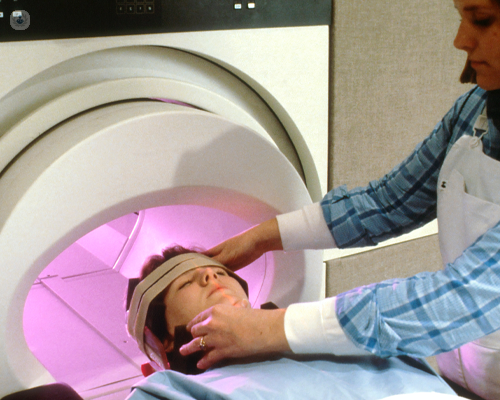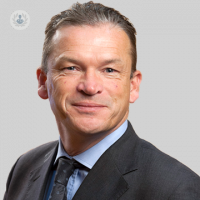Guide to treatment for skull base tumours
Written by:Most skull base tumours are benign but some can be cancerous and require rapid action. Even if they aren't life threatening and are causing symptoms, they need treatment. But what's involved? Leading consultant neurosurgeon Professor Andrew McEvoy has put together an expert guide.

After a diagnosis of skull base tumour, how quickly should treatment start?
The treatment for skull base tumours depends on the type of tumour, generally both benign and malignant tumours can occur in the skull base. Benign tumour like meningiomas, acoustic neuromas, nerve sheath tumours are slow growing and there is no immediate need to start treatment unless they become symptomatic and/or there is rapid tumour progression. Aggressive skull base tumours like chordomas/chondrosarcomas need treatment sooner.
What treatments are there for skull base tumours?
Surgery and radiotherapy are the main treatment modality for skull base tumours or a combined modality approach with surgery followed by adjuvant radiotherapy, can be considered.
What factors do you take into account when creating a treatment plan?
- tumour histology
- location of tumour
- age of patient
- performance status of patient
- rapidness of tumour progression
- radiotherapy tolerance of surrounding organs at risk such as:
- 1. Brainstem.
- 2. Spinal cord.
- 3. Optic nerves.
- 4. Cochlea
- 5. Retina.
- 6. Cranial nerve.
- 7. Brain tissue.
- 8. Hippocampus.
What is the survival rate of patients with a skull base tumour?
The survival rate of skull base tumours depends on the histology of the tumour and whether they are benign/aggressive. Generally, benign tumours are more common in skull base region and the survival is very good for such benign tumours like meningiomas. Chordomas are more aggressive and malignant tumours and five-year survival is around 70 per cent. Chondrosarcoma which occurs in the skull base have a better five-year survival rate of 85 per cent.
When is palliative care the best option?
Skull base tumours are best managed with surgery, radiotherapy or a combined surgery-radiotherapy approach, but if the skull base tumours are extensive/advanced with severe symptoms in an elderly patient with poor performance status, then palliative care would be the most appropriate management.
What is the life expectancy of patients after treatment?
Life expectancy depends on the histology and aggressiveness of skull base tumours. Most benign tumours have a good prognosis and longer life expectancy, but aggressive tumours like chordoma/secondaries tend to have a shorter life expectancy.
How often should patients have check-ups after recovery?
Benign tumours are followed up clinically at six monthly intervals in the first year after their treatment and thereafter with annual scans. Aggressive skull base tumours are followed up at four to six monthly intervals. The follow up check-ups include clinical examination and yearly MRI scans.
Schedule a consultation with Professor McEvoy by visiting his Top Doctors profile today.


